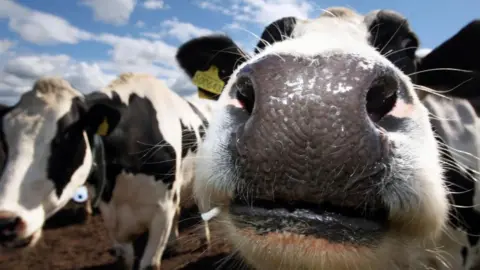Further bluetongue cases confirmed on two farms
 PA Media
PA MediaA deadly virus that affects cattle and sheep has been confirmed on two Hertfordshire farms.
The positive cases of bluetongue were confirmed by Hertfordshire County Council.
The Department for Environment, Food and Rural Affairs (Defra) said because three new cases had been identified along the Hertfordshire/Buckinghamshire border, its zone that restricts the moving of animals has been extended and now includes Buckinghamshire and parts of Berkshire.
The virus is spread by the bites of midges that are often blown over from the continent during spells of warm weather.
Morris Bright, executive member for public health and community safety, at the council, said: "While there is no risk to the public, or to food safety, these confirmed cases in Hertfordshire will be worrying for farmers.
"We’re working closely with the government and local farmers to make sure the necessary control measures are in place to hopefully prevent this disease spreading to other farms."
Defra said bluetongue, which can cause infertility and breathing problems in some animals but does not affect people or food safety, had been found at several premises since the latest outbreak was first detected in Suffolk on 26 August.
It said the disease could prove fatal for infected animals "in the most severe cases".
Symptoms vary across susceptible species but include fever, lesions, redness of the mouth, eyes, nose, reddening of the skin above the hoof, excessive salivation and nasal discharge.
But some animals may show few or no clinical signs, it added.
Details of the restrictive zone are available on the Defra website, and farmers are asked to report any suspicion of the disease immediately.
Follow Beds, Herts and Bucks news on BBC Sounds, Facebook, Instagram and X.
